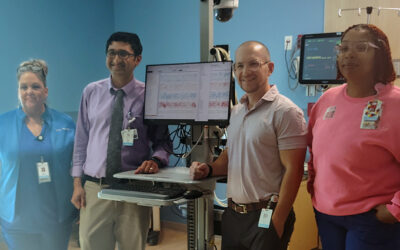Sometimes, the best support we can provide our patients isn’t something tangible like a vaccine or medicine, but rather allowing the patient to process things in their own time and make their own improvements.
Personalized Persistence
Social workers provide critical care to patients by offering information and counseling, especially if someone is struggling with complex issues relating to mental health, stress or addiction.
Our Lady of the Lake social worker Keaira Landry, LMSW, received a referral from one of our providers who shared he had a patient struggling with mental health issues along with alcoholism, lack of social connections and transportation with frequent trips to the ER.
Landry initially contacted the patient to help problem-solve and prioritize his needs, but the patient was unavailable, so she left a message. Less than an hour later, the patient returned the call. The patient was nervous and expressed his struggles with depression and alcohol use. The encounter lasted about an hour discussing his history and needs. However, the patient was still not ready for treatment or interested in counseling.
The discussion could have easily been dismissed as a patient not interested in assistance, but Landry felt he needed her support. She provided the patient with resources for food insecurity, counseling, transportation, as well as some fitness places in his area.
It is routine for social workers to follow up within a week or two. When that time came, the patient and Landry played “phone tag” again trying to contact each other. She sent the patient a MyChart message to continue to offer support and the patient responded via MyChart at various times throughout the night. When they were able to get connected again, the patient expressed gratitude to Landry and by this time was more than comfortable with sharing additional needs and concerns.
After the patient’s father passed away. Landry provided him with supportive counseling and grief resources. She also encouraged him to return to journaling and writing.
Ultimately, the success was in the rapport Landry and the patient had established, and that patient felt supported enough to reach back out to the social worker for help. This is a vital extension of our care beyond our facility walls that allows us to deliver truly comprehensive care to our patients that not only addresses the issues that they come to us with, but also the factors that play a part in creating them.
Dealing With a Diagnosis
Patients process information regarding their health diagnoses differently. While some are proactive, others may dispel or delay taking action to find treatment. Those latter patients may need support and a caring touch outside of the exam room to help them come to terms with their situation and do what they can to address it.
Our Lady of the Lake Health social worker Melinda Holmes, LMSW, and a community health worker received a referral for a patient who had been diagnosed with diabetes and was not taking her prescribed medication correctly. The patient described grieving her mother’s passing, just getting over a recent illness, and confessed that she had not been adherent with her medications and had not fully come to terms with taking insulin. The patient expressed she felt that she had done a great job maintaining her health and denied the diagnosis in the past.
Holmes provided supportive counseling regarding adherence to medical treatment. The patient shared that she had taken education classes before and that she could try the classes again. The following week Holmes and the community health worker contacted the patient in reference to diabetic services in the area, which the patient was receptive to. They also gave her information about a healthy program in the area.
Holmes not only provided the patient with resources that would be helpful to address her diagnosis but also took the time to get to understand why she was struggling to come to terms with it. Once they were able to accomplish that, the patient was receptive to the help available.




